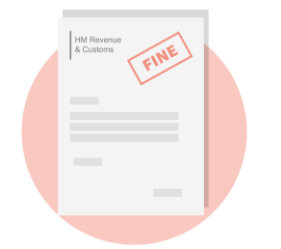HMRC’s new points-based system for tax penalties

The way HMRC penalise late taxpayers is changing. A new points-based system for tax penalties is being introduced and will initially apply to VAT and Self-Assessment. The system is designed to clamp down on those who consistently submit returns and pay late, rather than punish people for making one-off mistakes.
Here, AXA explains everything you need to know about HMRC’s new points-based penalty system.
What is the new tax penalty points-based system?

Under the new tax penalty system, you’ll get a penalty point for missing a deadline rather than an automatic fine. The more deadlines you miss, the more points you get. Taxpayers will get a £200 fine when they reach a certain number of points and another £200 fine for every subsequent missed deadline. The £200 penalty threshold depends on whether you submit tax returns monthly, quarterly or annually.
| Submission frequency | Penalty threshold (£200 fine) |
| Annually | 2 points |
| Quarterly (including Making Tax Digital for Income Tax Self-Assessment) | 4 points |
| Monthly | 5 points |
When is the new tax penalty system being introduced?
The new system was announced in the 2021 Budget and will come into effect gradually from April 2022. The date the new points-based system is introduced depends on the taxpayer’s specific tax obligations.
| Type of taxpayer | Start date |
| VAT | 1 April 2022 |
| Self-Assessment with income over £10,000 per year who need to send digital returns through Making Tax Digital. | 6 April 2023 |
| All other Self-Assessment | 6 April 2024 |
How are the penalty points counted?
Taxpayers have a running points total for every tax obligation they have. So, if they miss one deadline but successfully meet the others, they will only accrue one set of points.
For example, if a taxpayer submits an annual Self-Assessment return and quarterly VAT returns, they will have separate points totals. If both returns are late, a point will be added to the running total for each; one point for the group of annual returns for the late Self-Assessment and one point for the group of quarterly returns for the late VAT.
Even if the tax returns have the same submission frequency (e.g. all annually), the taxpayer would still get a point for each late return. This means taxpayers who consistently submit late for their different tax obligations could face heavy fines under the new system.

What happens if you submit late in the same month?
If taxpayers make two late submissions relating to the same obligation in the one month, they will only get one point. HMRC say they’ve done this to give taxpayers the chance to improve. However, when it comes to Making Tax Digital, if you have a quarterly Self-Assessment deadline and an annual return due in the same month, you’ll get two points if you miss both.
When do tax penalty points expire?
Penalty points expire after two years. The two-year period is calculated from the month after the failure occurred. However, points will not expire when a taxpayer is at the penalty threshold. When a taxpayer reaches the penalty threshold, their points will only reset to zero when they:
1. achieve a period of compliance (the threshold for this will depend on reporting obligations).
2. submit all the returns due within the preceding 24 months. (It doesn’t matter if these submissions were initially late.)

The periods of compliance are:
| Submission frequency | Period of compliance |
| Annually | 2 years |
| Quarterly (including Making Tax Digital for Income Tax Self-Assessment) | 1 year |
| Monthly | 6 months |
Can I get a penalty point for historic failures?

HMRC must give you a penalty point within the agreed time limit. After the agreed time limit has passed, HMRC can’t give you a point.
As with most of the timescales for the new penalty point-based system, the time limits for this depend on how often you submit tax returns.
| Submission frequency | Time limit for HMRC to levy point |
| Annually | 48 weeks |
| Quarterly (including Making Tax Digital for Income Tax Self-Assessment) | 11 weeks |
| Monthly | 2 weeks |
Appealing a point or financial penalty
Taxpayers can challenge a point or financial penalty through:
- the internal HMRC review process
- an appeal to the courts (the First Tier Tax Tribunal)
If taxpayers want to appeal a point, they should follow the same process for appealing an assessment of tax for the relevant tax obligation. An appeal will be successful if HMRC think the taxpayer had a ‘reasonable excuse’ for missing their deadline. HMRC published guidance on what they class as a reasonable excuse which include things like:
- postal delays
- computer or software failures
- an unexpected hospital stay
- the death of a partner or close family member
- issues with HMRC’s online services Read the full guidance here
Read the full guidance here.
What happens if you change the frequency of reporting?
Taxpayers can request to change how often they submit tax returns. For example, a taxpayer can ask to submit VAT returns monthly, quarterly or annually.
HMRC will adjust the points total accordingly for those who need to change their reporting frequency. However, if you’re on zero points you’ll stay at zero
| Change in reporting frequency | Adjustment to points total |
| Annually to quarterly |

2 points
|
| Annually to monthly |

3 points
|
| Quarterly to annually |

2 points
|
| Quarterly to monthly |

1 points
|
| Monthly to annually |

3 points
|
| Monthly to annually |

1 points
|
VAT groups and penalty points

If a VAT group has penalty points and a member of that group is replaced, the points will stay with the group and be transferred to the new member. And if a new member joins, the points for the group will continue unchanged.
Where a member leaves a VAT group with penalty points and registers with a new VAT registration number, they will start with zero points and the points will remain with the original VAT group. Where a completely new VAT is formed, any penalty points previously incurred by group members won’t be transferred to the new group.
Non-standard accounting period and penalty points
In some circumstances, taxpayers can provide submissions for non-standard accounting periods. These periods include those at the beginning or end of a period of VAT liability, or where a taxpayer changes the frequency of return submissions.
Non-standard accounting periods aren’t included in the new penalty points-based system. However, this exemption for non-standard periods won’t apply if the taxpayer deliberately fails to meet their obligations.
As well as the introduction of the new points-based system for tax penalties, there are a number of key changes to tax rules in 2021/22, including updates to the self-employed tax threshold.
Find out what the changes to tax rules mean for self-employed people and small businesses here.
Work hard, insure easy
Running a business is hard work. That’s why we’re doing all we can to make your insurance a bit easier. From helping you tailor your policy to your unique business needs, to taking the guesswork out of finding business insurance, find out what we’re doing to help small businesses.